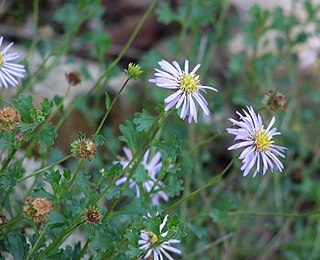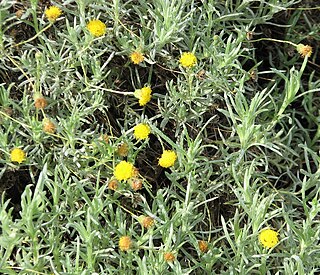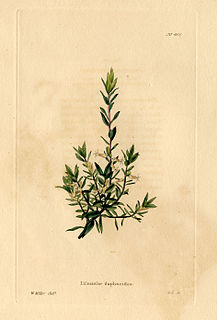
Leucopogon is a genus of about 150-160 species of shrubs or small trees in the family Ericaceae, in the section of that family formerly treated as the separate family Epacridaceae. They are native to Australia, New Zealand, New Caledonia, the western Pacific Islands and Malaysia, with the greatest species diversity in southeastern Australia. Plants in this genus have leaves with a few more or less parallel veins, and tube-shaped flowers usually with a white beard inside.

Bertya is a genus of plants in the family Euphorbiaceae first described as a genus in 1845. The entire genus is endemic to Australia.

Cassinia is a large genus of plants in the family Asteraceae, most or all of which are native to the Southern Hemisphere. It was named for French botanist Alexandre de Cassini.

Astroloma is an endemic Australian genus of around 20 species of flowering plants in the family Ericaceae. The majority of the species are endemic to Western Australia, but a few species occur in New South Wales, Victoria, Tasmania and South Australia.

Pluchea is a genus of flowering plants in the stinkwort tribe within the sunflower family.

Trianthema is a genus of flowering plants in the ice plant family, Aizoaceae. Members of the genus are annuals or perennials generally characterized by fleshy, opposite, unequal, smooth-margined leaves, a prostrate growth form, flowers with five perianth segments subtended by a pair of bracts, and a fruit with a winged lid. The genus contains about 30 described species growing in tropical and subtropical regions, especially Australia. One common species, Trianthema portulacastrum, desert horse purslane, is frequent as a weed in agricultural areas and is widely distributed.

Calotis is a genus of herbs or small shrubs in the daisy family Asteraceae. Most of the species are native to Australia, while two occur in Asia.

Leiocarpa is a genus of plants in the family Asteraceae, native to Australia.

Styphelia is a genus of shrubs in the family Ericaceae and is endemic to Australia. Most have minute or small leaves with a sharp tip, single, tube-shaped flowers arranged in leaf axils and with the ends of the petals rolled back with hairs in the inside of the tube.
Leptorhynchos is a genus of annual or perennial herbs in the family Asteraceae. All species are endemic to Australia. These include:

Brachyloma is a genus of shrubs in the family Ericaceae. The genus is endemic to Australia.
Eriochlamys is a genus of Australian flowering plants in the daisy family.

Streptoglossa is a genus of Australian plants in the inula tribe within the daisy family.

{{taxobox |image = Asteridea pulverulenta - Flickr - Kevin Thiele.jpg |image_caption = Asteridea pulverulenta |regnum = Plantae |unranked_divisio = Angiosperms |tribus=Gnaphalieae |unranked_classis = Eudicots |unranked_ordo = Asterids |ordo = Asterales |familia = Asteraceae |genus = Asteridea |genus_authority = Lindl. |type_species = Asteridea pulverulenta |type_species_authority = Lindl. }} Asteridea is a genus of flowering plants in the daisy family. Evidence suggests that the genus, Asteridea, is monophyletic.

Andersonia is a genus of small evergreen shrubs in the family Ericaceae. The genus is endemic to the Southwest Botanical Province in Western Australia.

Acrothamnus is a genus of flowering plants in the family Ericaceae. The species, which were formerly included in the genus Leucopogon, occur in eastern Australia, New Zealand, New Guinea and the Pacific. They include:

Aphelia is a genus of plants in the Restionaceae family. The entire genus is endemic to Australia. APG III system classifies this genus in the Centrolepidaceae family.

Roepera is a genus of flowering plant in the family Zygophyllaceae. It is native to southern Africa and Australia.
















